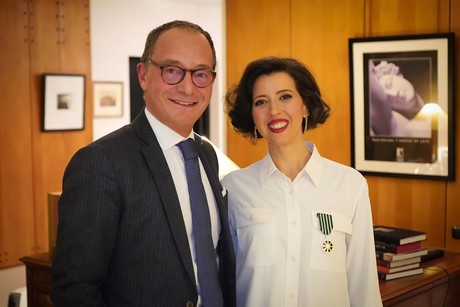Rigoletto
Music by
Giuseppe Verdi
Cast
| Rigoletto | Željko Lučić | |
| Gilda | Lisette Oropesa | |
| Duke of Mantua | Vittorio Grigolo | |
| Sparafucile | Kwangchul Youn | |
| Maddalena | Elena Maximova | |
| Giovanna | Marie Gautrot | |
| Count Monterone | Robert Pomakov | |
| Marullo | Christophe Gay | |
| Borsa | Julien Dran | |
| Count Ceprano | Mikhail Timoshenko | |
| Countess Ceprano | Veta Pilipenko | |
| Page | Laure Poissonnier | |
| Rigoletto Double | Henri Bernard Guizirian |
Daniele Rustioni
ProductionClaus Guth
Set DesignerChristian Schmidt
ChoreographyTeresa Rotemberg
LightingOlaf Winter
DirectorKonrad Kuhn
ChorusmasterJosé Luis Basso
About
"The moment of vengeance has finally come. For thirty da ys I have waited, Weeping tears of blood, behind the mask of a buffoon."
Rigoletto, Acte III
In Victor Hugo’s luxuriant drama Le Roi s’amuse, Verdi found theatre worthy of Shakespeare. Such, at least, were his enthusiastic words when he urged his librettist Piave to scour all Venice to find someone with sufficient influence to get his new opera past the censors unscathed. Alas, conventional morality rose up in protest and it proved impossible. Verdi’s hunchbacked jester is one of the most complex and tormented figures in the entire operatic repertoire: monstrous and heartbreaking, grotesque and sublime, this tragically doomed father who seeks to save his daughter from the clutches of the duke, will be the one to kill her. The role reaches its apogee in the aria “Cortigiani, vil razza dannata”, in which the descending movement, from Rigoletto’s explosion of rage to his begging, confirms Verdi’s capacity to adapt traditional bel canto to the demands of theatrical verisimilitude. This is director Claus Guth’s first production for the Paris Opera.

Chevalier de l’Ordre des Arts et des Lettres
Lisette is awarded the title of Chevalier de l’Ordre des Arts et des Lettres by the French minister of Culture.

Lisette Oropesa steps in for two performances of Rigoletto at the Opéra national de Paris
Lisette Oropesa steps in for two performances of Rigoletto at the Opéra national de Paris
Reviews
Lisette Oropesa, Gilda surprise dans Rigoletto à Bastille
Son sens de la nuance, exceptionnel et charmant, lui garantit de toute façon d’emblée une ovation en fin de soirée : capable de percuter le spectateur d’un aigu flamboyant, elle allège ailleurs son chant sur quelques syllabes susurrant un aigu intense et long. Elle achève son premier air (et le public) d’un suraigu pur dont le vibrato s’élargit progressivement pour se changer en trille.Her exceptional and charming sense of nuance guarantees her a standing ovation at the end of the night: able to strike the audience with a flaming high note, she elsewhere lightens her singing on a few syllables, whispering an intense and long high note. She completes her first aria (and the audience) with a pure, super high note, the vibrato of which gradually widens to change into a trill.— Damien Dutilleul • Olyrix
Performance History
Lisette has given 73 performances as Gilda.
2025
Arena di Verona
LA Opera2022
Metropolitan Opera
Wiener Staatsoper2021
Royal Opera House2018
Teatro dell'Opera di Roma
Arena di Verona
LA Opera2017
De Nationale Opera2016
Teatro dell'Opera di Roma2015
Teatro Real
Bayerische Staatsoper
Het Concertgebouw2014
Grand Théâtre de Genève2013
Metropolitan Opera2008
Arizona Opera
New Orleans Opera


